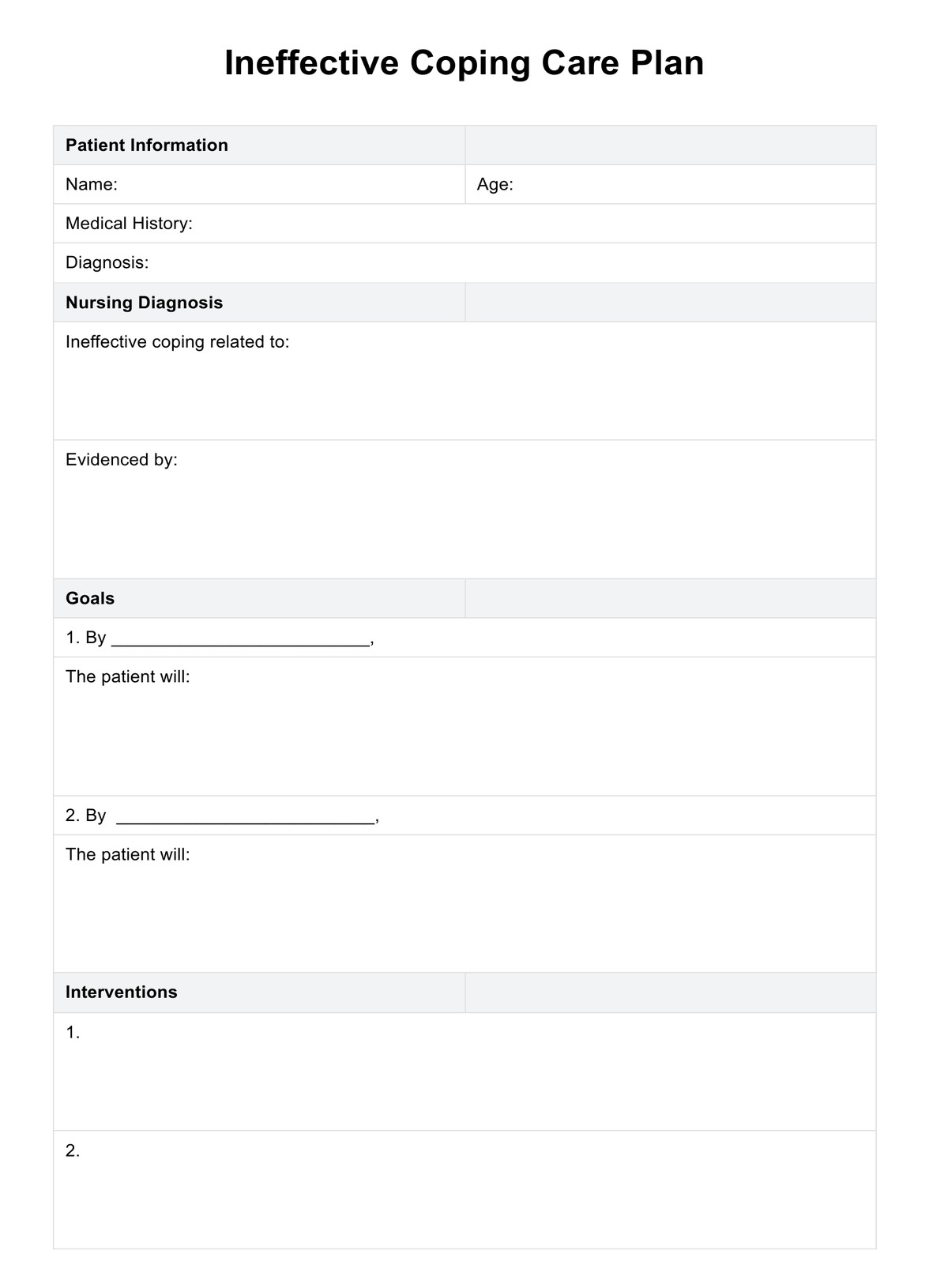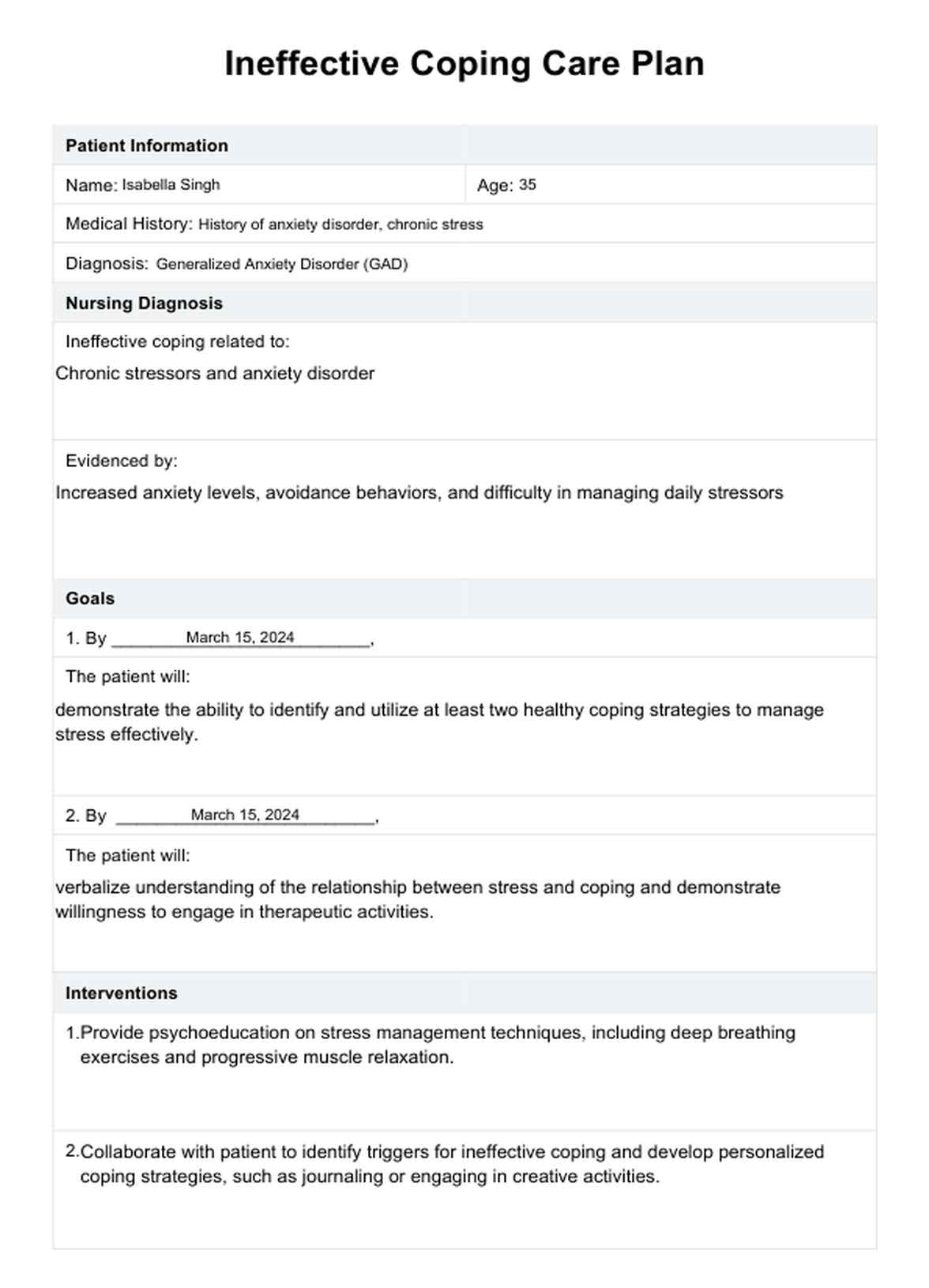Ineffective Coping Care Plan
Discover examples of ineffective coping care plans and get Carepatron's free PDF download to help you understand how to address these issues in your care plans effectively.


What is ineffective coping?
Ineffective coping refers to an individual's inability to manage stress, emotions, or difficult situations in a healthy and adaptive manner. It involves using coping mechanisms that are not conducive to resolving the underlying issues or reducing distress. Coping strategies are vital for navigating life's challenges, but they can be considered ineffective when they fail to address the root cause of stressors.
In nursing terms, ineffective coping is recognized as a nursing diagnosis, indicating the need for intervention and support. It manifests through various symptoms such as increased anxiety, withdrawal from social interactions, or resorting to destructive coping mechanisms like substance abuse.
Nursing interventions for ineffective coping often focus on teaching patients appropriate coping strategies and stress management ways. These may include engaging in mental and physical activities, learning coping skills, and developing problem-solving abilities. Additionally, active listening and emotional support are crucial for helping individuals cope effectively.
Problems the lack of effective coping mechanisms may lead to
The absence of effective coping mechanisms can result in various challenges that affect mental health and interpersonal relationships. Here are some potential problems associated with ineffective coping:
- Increased risk of developing anxiety disorders
- Difficulty managing stress and emotions
- Strain on relationships with family members
- Inability to cope effectively with daily stressors
- Limited problem-solving skills
- Higher likelihood of experiencing depression or mood disturbances
- Reduced ability to adapt to changes and setbacks
- Impaired decision-making abilities
- Higher susceptibility to unhealthy coping mechanisms such as substance abuse
- Decreased overall quality of life and well-being
Recognizing the importance of developing and eliminating ineffective coping mechanisms is essential for maintaining mental health and fostering resilience in the face of challenges.
Ineffective Coping Care Plan Template
Ineffective Coping Care Plan Example
How healthcare professionals help people cope effectively
Healthcare professionals play a crucial role in assisting individuals in effectively coping with life's challenges. Here are some ways they provide support:
1. Assessment and nursing diagnosis
Healthcare professionals, particularly nurses, conduct thorough assessments to identify ineffective coping strategies and related issues. Through nursing diagnoses, they pinpoint areas of concern and develop tailored interventions.
2. Education and counseling
Healthcare professionals educate individuals about healthy coping strategies and provide counseling to enhance coping skills. This may involve teaching stress management techniques, problem-solving skills, and relaxation exercises.
3. Emotional support
Healthcare professionals offer such kind of support to individuals experiencing distress. They create a safe space for individuals to express their feelings and concerns through active listening and empathy.
4. Interventions and referrals
Based on the assessment findings, healthcare professionals implement interventions to promote effective coping. This may include cognitive-behavioral therapy, support groups, or referrals to mental health specialists.
5. Collaboration and holistic care
Healthcare professionals collaborate with interdisciplinary teams to address the multifaceted aspects of coping effectively. They integrate physical, emotional, and social interventions to promote overall well-being.
6. Monitoring and follow-up
Healthcare professionals monitor individuals' progress in coping and adjust interventions as needed. Regular follow-up appointments allow for ongoing support and evaluation of coping strategies.
7. Promoting healthy coping mechanisms
Healthcare professionals encourage individuals to engage in healthy mechanisms recommended by organizations like the World Health Organization (WHO). These include exercise, social support, hobbies, and relaxation techniques.
How are Ineffective Coping Care Plans usually structured?
Ineffective coping care plans are structured to address the specific needs and challenges of individuals struggling with ineffective coping mechanisms. Here's how they are typically organized:
Assessment and diagnosis
Begin with a comprehensive assessment to identify the patient's ineffective coping patterns, including abnormal coping behavior and poor self-concept. Utilize nursing diagnoses to articulate the specific issues related to ineffective coping, considering any underlying mental health conditions or chronic illnesses such as chronic fatigue syndrome.
Goal setting
Establish clear and measurable goals in collaboration with the patient to promote healthy coping mechanisms and improve overall well-being. Goals may focus on enhancing coping skills, building support systems, and addressing underlying psychological or emotional issues.
Interventions
Implement evidence-based interventions to address the identified coping challenges. Interventions may include providing emotional support, teaching therapeutic communication techniques, and promoting self-care practices.
Education and support
Educate the patient about the importance of effective coping strategies and recognizing and managing stressors. Offer support in developing and maintaining support systems, including friends, family, and community resources.
Monitoring and evaluation
Regularly assess the patient's progress toward goals and adjust interventions as needed. Use therapeutic communication techniques to explore patients' feelings and perceptions about coping strategies. Lastly, the effectiveness of the care plan in promoting adaptive coping and improving the patient's quality of life will be evaluated.
How to use our Ineffective Coping Care Plan template
Using Carepatron's Ineffective Coping Care Plan template is straightforward and can significantly aid healthcare professionals in providing tailored support to individuals struggling with ineffective coping mechanisms. Here's how to utilize the template effectively:
Access the template
Begin by accessing the Ineffective Coping Care Plan template through Carepatron's platform. If you haven't already signed up for an account, you'll need to do so to access the template library.
Assess the patient
Before filling out the template, thoroughly assess the patient's coping patterns and related issues. Identify any abnormal coping behaviors, mental health conditions, or underlying stressors contributing to ineffective coping.
Input patient information
Start by inputting the patient's demographic information, including their name, age, medical history, and any relevant diagnoses.
Record nursing diagnoses
Utilize the template to document nursing diagnoses related to ineffective coping. Clearly articulate the specific issues and challenges the patient is facing in coping effectively.
Set goals
Collaborate with the patient to set clear and measurable goals for improving coping skills and overall well-being. Ensure that the goals are achievable and relevant to the patient's needs and preferences.
Outline interventions
Use the template to outline evidence-based interventions to address the identified coping challenges. Include strategies for providing emotional support, teaching coping skills, and promoting healthy coping mechanisms.
Share resources
Document educational resources or support services that may help the patient develop effective coping strategies. Guide on accessing community resources and building support systems.
Monitor and evaluate
Regularly monitor the patient's progress toward goals and evaluate the effectiveness of the care plan interventions. Use the template to document changes in the patient's coping abilities and adjust the care plan as needed.
Benefits of having this care plan
Utilizing the Ineffective Coping Care Plan template provided by Carepatron offers several benefits for both healthcare professionals and patients:
Tailored intervention strategies
The template allows healthcare professionals to develop customized intervention strategies based on each patient's specific needs and challenges. By addressing individual coping patterns and stressors, interventions are more likely to be effective in promoting adaptive coping mechanisms.
Enhanced collaboration and communication
With a structured care plan, healthcare teams can collaborate more effectively and communicate the patient's needs and goals. This promotes continuity of care and ensures that all team members are aligned in supporting the patient.
Improved patient outcomes
Patients are better equipped to manage stressors and improve their overall well-being by addressing ineffective coping mechanisms early and implementing targeted interventions. Research has shown that structured care plans lead to better patient outcomes and reduced healthcare utilization.
Empowerment and engagement
Involving patients in the care planning process empowers them to take an active role in managing their health. The Carepatron template encourages patient engagement by soliciting input in goal setting and promoting self-management strategies, leading to greater satisfaction and adherence to the care plan.
Documentation and accountability
The template provides a standardized format for documenting nursing diagnoses, goals, and interventions, ensuring comprehensive patient care journey documentation. This promotes accountability among healthcare professionals and facilitates tracking of progress over time. Additionally, well-documented care plans support continuity of care during transitions between healthcare settings.
Commonly asked questions
An example of ineffective coping is turning to alcohol or drugs to deal with stress instead of seeking healthier coping mechanisms.
A goal for a patient with ineffective coping may be to learn and practice healthy stress management techniques to improve their ability to cope with life's challenges effectively.
Yes, "Risk for Ineffective Coping" is indeed a nursing diagnosis used to identify individuals who are at risk of experiencing ineffective coping mechanisms in response to stressors.




















-template.jpg)



















































































